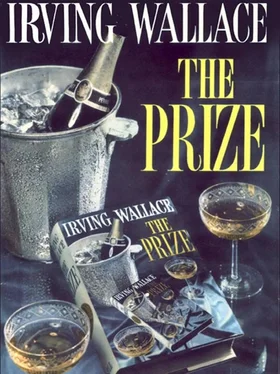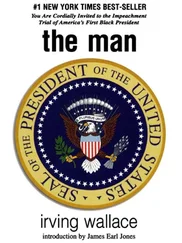They moved on to the far wall of the room. Jacobsson identified the paintings on either side of the oil of Nobel himself. ‘This is Bertha von Suttner, the most important woman in Nobel’s life besides his mother. She had been a titled governess in Austria, and was fired, when she read an advertisement in a Vienna newspaper-“Elderly, cultured gentleman, very wealthy, resident of Paris, seeks equally mature lady, linguist, as secretary and supervisor of household.” She answered the advertisement, and Nobel was the elderly, cultured gentleman, very wealthy. She became his secretary, and often his adviser. Later, she left him to marry a young baron and become one of the world’s foremost pacifists. It is possible that she influenced Nobel to create the Peace Prize. At any rate, we feel that she belongs beside him on this wall. The painting on the other side is of Ragnar Sohlman, an executive director of this Foundation, who died in 1948. He had been a personal friend of Nobel’s and one of the executors of the famous will.’
Jacobsson pointed out the three bronze busts in the room. ‘This one is of Nobel. We move it to Concert Hall on the tenth for the Ceremony, and then bring it back here. That one is Nobel’s father, and the other, one of his brothers. Now, perhaps, you are curious about what took place in the session hall the afternoon your names were presented?’
‘I am most curious,’ Denise admitted.
‘The four leading chemistry candidates were decided upon earlier in this room,’ said Jacobsson. ‘You yourselves were one. Two Americans, as another team. A Dane. And a candidate from Israel. Of the other candidates, one was considered for his pioneer work in the creation of life, of a living cell. But it was felt that his findings were not yet conclusive. Another had accomplished much in the dissolving of blood clots. Again, the work was considered in its primitive stage. The third, our American candidates, had made progress in new drugs for mental unbalance. In one case, I will admit, a certain prejudice was held against the candidate. He was wealthy and his work commercial, and certain judges were against him for no other reasons. You will understand the sensitivity of the judges when I explain that, although Nobel had once stated that he wanted to reward dreamers who found it hard to get on in life, in contradiction to this, the chemistry committee had given the 1931, award to Karl Bosch head of the I. G. Farben cartel, and to Friedrich Bergius, also of Farben, for making coal into oil. The committee was soundly criticized for its choice. At any rate, the current judges decided that both of you were dreamers, qualified in every way, and your discovery of sperm vitrification thoroughly proved. The debate lasted less than two hours. You were elected laureates by a vote of better than two to one.’
‘We are very humble,’ said Claude sincerely. ‘I thank you for the information.’
They had gone back into the hall as Jacobsson was talking, and now Jacobsson saw them to the exit at the end of the corridor. After shaking hands, Denise reminded him, ‘Count Jacobsson, you will not forget to fill our schedule. We want to be busy every minute.’
‘I shall be delighted to oblige,’ said Jacobsson.
As they went through the door, Jacobsson closed it and turned to find Mrs. Steen waiting directly behind him with some papers. Because he halted beside the door to consult with Mrs. Steen, he was able to hear what went on beyond the door.
He heard first Claude Marceau’s muffled voice and then Denise Marceau’s reply.
Claude had said, ‘Very clever with that schedule, but idiotic. Do you think that could keep me from Copenhagen if I wanted to go?’
Denise Marceau had said, ‘Go to hell.’
Embarrassed, Jacobsson stared down at the green carpeting, until the footsteps of the laureates had receded and were gone.
Jacobsson made no pretence of not having overheard the exchange. Lifting his head to meet Mrs. Steen’s phlegmatic gaze, he said, ‘What do you think, Mrs. Steen?’
Like her adding machine, Mrs. Steen was without deviousness. She replied, ‘If they should ever win a second prize, like the Curies, I am sure only one of them would return to Stockholm -the one who had murdered the other.’
‘Mmm. That is my thought, too, Mrs. Steen, And my prayer is-should homicide happen, let it not happen before the Ceremony.’
In the gloom of the cold winter morning, the three-cylinder Saab-93 sped over Solnavägen towards that area where the many buildings of the Caroline Medico-Chirurgical Institute were located.
At the wheel of the Saab was a young driver for the Institute. In the confined back seat, normally loose and removable because it covered the car trunk, the displacement was three-quarters Ingrid Påhl and one-quarter Dr. John Garrett. Wearing her enormous new hat banded with artificial roses and her heaviest woollen coat-she was sure the temperature was close to Celsius 0°, which would be Fahrenheit 32° and freezing-Ingrid Påhl had lost her earlier look of misgiving, and her puffy features were once more unburdened and even buoyant. When Krantz had pleaded emergency the night before, and backed out of taking Dr. Garrett to the Caroline Institute, and Jacobsson had telephoned her to replace Krantz, she had protested. She knew nothing of medicine. What would she have to say to Garrett? Nevertheless, as a duty, she had agreed to perform as hostess. But Garrett had proved to be a simple, friendly man, much engrossed in his own thoughts, and that had made her task easier.
For Garrett, pressed into the corner of the Saab, this was a crucial morning, and he was living inside himself. At his own request, the visit to Drottningholm Palace had been replaced by this appointment at the Caroline Institute. His protégé, Dr. Erik Öhman, was expecting him and waiting. Although Öhman could not know it, he was a vital weapon in the offensive Garrett was mounting against Carlo Farelli. This day, Garrett had determined, the counter-attack must begin.
There was nothing complex about Garrett’s battle plan. By his aggressiveness at the press conference, Farelli had claimed most of the space in the newspapers the following day. Garrett had been treated as an unwanted relative who had had to be introduced. He had been relegated to an occasional interjection or the spare room of last paragraphs or the graveyard of publicity that read, ‘Also present was-’. When Garrett, in his desperation, had attempted an impromptu guerrilla campaign against Farelli in the salon of the Royal Palace, he had been repulsed, and the defeat still rankled. Now he knew that his tactics must include, first, a carefully organized frontal assault on the battleground of the world’s front pages.
The meeting with Öhman would be Garrett’s first foray. He would learn of Öhman’s progress and future, all an extension of his own heart discovery. He would study Öhman’s three successful transplantations, and the three additional patients he now had under observation. This done, Garrett would then telephone Sue Wiley. He would offer himself, this very afternoon, for an interview more spectacular than the one he had given her on the airliner. He would reveal colourful details of his meeting with Öhman, human interest facts about Öhman’s patients, and in praising Öhman’s accomplishments, he would be praising himself. He would give Miss Wiley some concrete predictions about the future of his work. Farelli would be out of it entirely. It would be as if he, alone, were in Stockholm, as indeed he should have been. The story for Consolidated Newspapers would be carried throughout the world. That would be the beginning. He would hurl the monarch of darkness from the dais and have his rightful seat of honour at last.
It was all so satisfying. Garrett sighed with pleasure at the justice of his plan. Outside the window, the bleak morning appeared less forbidding. Beside him, Ingrid Påhl, screwing a cigarette into an ebony holder, appeared more attractive.
Читать дальше












